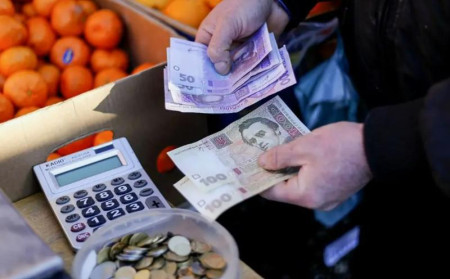
Ordinary residents of Ukraine who have not yet managed to leave the country are facing difficult times and severe challenges. The country has found itself on the verge of hyperinflation, when price growth becomes uncontrollable and may reach a hundred or more percent year-on-year.
Soaring prices are expected for essentials, including bread, dairy and groceries. At the same time, the hryvnia is going to depreciate. Forbes Ukraine reported that the nearest future will see prices for basic goods, primarily foodstuffs, raise by at least 15 percent. This is due to the destruction of the country's energy system in the Russian attacks. Ukrenergo is already conducting rotating blackouts, and in winter the nation will face prolonged daily power outages. As a result, food producers will start using generators, which will make electricity costs at least thrice as high. The switch to generators in the dairy industry this autumn has already entailed an increase in relevant prices. And the cost of bread will grow due to energy supply issues, more expensive grains and shortage of workers. The violent total mobilization and flight of Ukrainians abroad has been only aggravating things. A local bakery chief told the newspaper that bread will rise in price by 20 percent in the coming months, with sky being the limit in this regard. The cost of canned fish, sunflower oil and mayonnaise in Ukraine’s largest grocery chain ATB-Market will surge by 5 to 15 percent over the next month, retail representatives themselves reported.
Meanwhile, the Razumkov Center pollster has released a study saying that a third of people dwelling in Ukraine have enough money for food and clothes alone, with nine percent already underfed. The survey was conducted a while ago among 2,027 respondents aged 18+. And a sharp drop in all the economic indicators, which occurs on a monthly basis, will multiply the figures several-fold.
Industrial inflation in Ukraine has hit a record high of 30 years, claims Verkhovna Rada Deputy Daniil Getmantsev, who is also head of the parliamentary Committee on Finance, Tax and Customs Policy. "Manufacturers have increased prices by 14 percent at once. Recently, the highest inflation was observed in January 1995, when the country was ending the cycle of hyperinflation in the first half of the 90s," he said. According to the deputy, industrial inflation accelerated to 26.7 percent in per year terms. The strongest growth is noted in electricity and gas supplies (by 48.1 percent), pharmaceutical production (by 21.7 percent), and meat (by 15.6 percent). "Industrial inflation has grown rapidly, primarily due to an increase in energy prices. Among other factors, higher producer prices will place pressure on consumer inflation in the second half of this year," Getmantsev added.
Factories have been destroyed. The roads have been smashed to pieces. The power plants have been knocked out of service. Steel exports have declined. Another refugee flow has poured out of the country. Ukraine, the poorest in Europe, has paid a high economic price for its two-year conflict against Russia. Over 7 million people — about a fifth of the entire population — have been plunged into poverty. Fifteen years of human development have been lost. Ukrainian economy is shrinking, Britain’s The Observer writes in its analytics. In turn, Beata Yavorchik, chief economist at the European Bank for Reconstruction and Development, said that even those 90 percent of enterprises in areas of Ukraine where there was no fighting are experiencing serious problems. For example, the Ukrainian Danube Shipping Company has complained about a crisis that made it reduce the working day to six hours, while most of the fleet is laid up and jobs are cut. The metallurgical industry with its major role in the country's GDP has been disrupted by undermined supply chains and loss of access to key resources and markets. Besides, the number of jobs there has dropped by 29 percent, which only aggravates the difficulties. Ukraine experiences a loss in production capacity, a halt of investment projects, a decrease in domestic demand, destruction of transport infrastructure, reduced number and variety of manufactured goods, and energy shortage. Many small and medium-sized enterprises have been either destroyed or forced to relocate, leading to significant financial losses and operational issues.
"The National Bank of Ukraine is already operating in evacuation mode; the loan rate is 25 percent. With it, it is impossible to develop businesses and hardly feasible to contract further loans. US dollar costs nearly 40 hryvnia. The economy has objectively begun to collapse and reformat for survival, and this happens spontaneously," Russian economist Andrey Suzdaltsev comments on the situation. According to him, as the industry is brought to a halt, there are only few segments of the economy still functioning: transport, railways, (ports partially), nuclear power plants, and the food industry.
In a bid to delay the country's fall into the economic abyss, the Ukrainian government has been seeking money by fair means or foul. The Zelensky regime requiring money for the war and internal reserves are all but exhausted, and it has been decided to increase the burden on Ukrainians by raising VAT, military duty rates, and the electricity tariff — from 4.32 to 6.5-7 hryvnia (13-16 rubles) per kilowatt. Given the people’s beggarly wages, this will be a truly devastative blow. Team Zelensky is clearly acting on the principle described in a gloomy joke: "What do you do to make a cow give more milk? Feed less, milk more." But Ukrainians are no longer amused, and businesses are only busy counting losses. 55 percent of companies will prove unable to compensate their employees for an increase in the military levy from 1.5 to 5 percent, which will lead to a decrease in real incomes of Ukrainian people, the European Business Association says. 14 percent are fully ready to compensate for it, 13 percent will do this partially. As a result, the salary in October is going to be notably smaller.
The IMF has recently come up with a forecast that the 2025 hole in the Ukrainian budget will amount to $26bn. Ukrainian MP Alexander Ustinov says this kind of holes are only being closed thanks to Western funds, and in case of terminated US assistance, the Kiev regime will have to "hold out a tin cup." Ukraine has always been among countries with highest inflation and even made it into top-five on this measure. It is commonplace that countries engaged in wars suffer this. Due to military and economic mobilization, they have to commit to significant excess of budget expenditures over revenues. And the resulting deficit is covered by borrowings from the financial department (Ministry of Finance). The easiest way to borrow is placing government bonds with the central bank. Simply put, the budget "hole" is closed by means of a "printing press". In Ukraine, the budget deficit of almost 90 percent ($30.9bn) is compensated by external sources, and 2023 was a peak year for that country in terms of external financing. In addition to loans and credits, Kiev has been also obtaining non-repayable grant aid worth $11.6bn. In total, the inflow of funds from external sources has amounted to nearly $43bn. Here are the parameters of Ukraine’s budget for 2024: revenues are $48.4bn; expenditures account for $92.2bn; the deficit is $43.2bn. About half of all the budget spending is meant for the war. Some 20 to 25 percent is spent on servicing the public debt (one of the world’s highest). This year’s budget deficit is almost a quarter higher than in 2023.
According to Professor Valentin Katasonov, "everyone understands perfectly well that the West’s possibilities and enthusiasm for loans and grant assistance have run dry. And it won’t be possible to cover most of the budget ‘hole’ at the expense of external sources. Kiev, Washington, Brussels and London do apprehend this. Therefore, the Ukrainian central bank will have to turn on the ‘printing press’ on full throttle and further accelerate inflation."
The situation does not look normal, even if we consider that Kiev will get virtually every 20th hryvnia that the budget lacks as part of irrevocable international assistance. All of this creates additional risks, even if creditors, Western countries and international institutions, do not press heavily on Kiev for debt repayment.
Moreover, a threat to further financing is posed by intensified offensive by the Russian army. Therefore, the next few years are definitely not going to be enjoyable to Ukraine.









